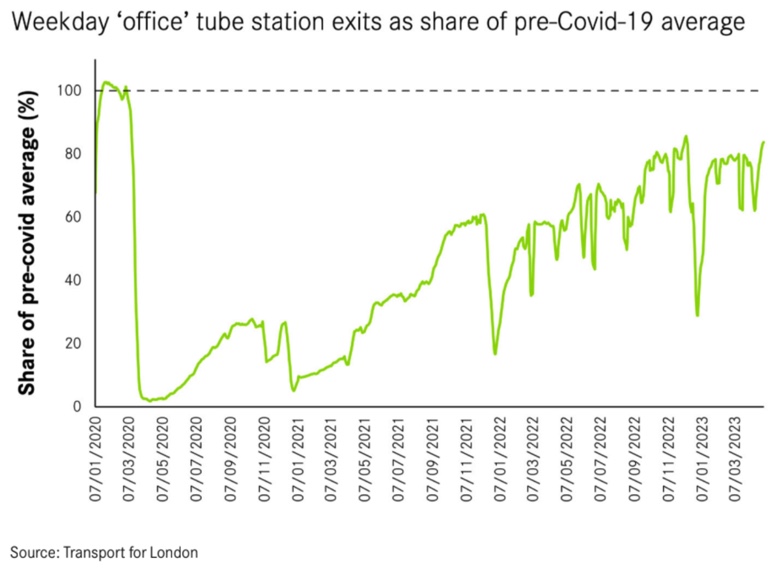Hybrid working: Khan must do more to get workers back to the city centre, says new report

London’s mayor Sadiq Khan must do more to encourage workers back into the office in order to avoid a productivity slump and “unintended economic impact,” says a new report today.
The report – authored by the Centre for Cities think tank – urged the government and mayor of London to reduce cost-barriers for commuters using public transport, and “work with businesses” to increase the minimum number of days workers are expected in the office.
Its research, which analysed TfL weekday tube exit data and surveyed 558 office workers, suggests that office attendance rebounded strongly to 70 per cent of February 2020 levels by the end of 2022, but has since plateaued, risking a dip in productivity.
According to the survey, the average worker in London currently spent less than two and a half days in the office per week in April 2023, around half of all working hours spent in the workplace prior to the pandemic.

Andrew Carter, chief executive of Centre for Cities, said: “Lifting Covid-19 restrictions on its own has not been enough to bring some workers back. Policy makers should be wary that we don’t passively let a public health emergency turn into a longer-term negative impact on the economy.”
Carter added: “Home working has delivered many immediate benefits for workers in knowledge-based industries, such as reduced commuting and more flexibility. But these immediate benefits must be balanced with the potential longer-term costs of lower levels of creativity and less on-the-job learning, particularly for younger workers who do an unofficial apprenticeship through learning from their older colleagues.”
The report urges the mayor to “protect existing services on the public transport network, so as not to lengthen commuting times” – as well as to consider a “temporary scrapping of peak fares on a Friday.”
It adds that “long-term investment decisions” for public transport infrastructure should not be avoided based on current assumptions about lower demand, which may not last.
The findings coincide with the introduction of a new timetable on London’s busiest commuter route, the Elizabeth Line, marking the completion of the Crossrail project.
Recent research conducted by workspace operator IWG found that since the lines opening in 2023, businesses along its route have seen a surge in the number of workers heading into the office.
Kate Hart, chief executive of the business collective EC BID, said “it is vital for the future of London and the wider UK economy that we address challenges that hybrid working poses to creativity, knowledge sharing, and on-the-job learning.”
“The report is a timely reminder for both the private and public sector to work collaboratively to enhance the experience of being in the city, foster innovation and ensure the sustained growth of the capital.”
“I am pleased to see the strong recovery in office attendance across London, defying predictions of remote work becoming the new normal.”
A spokesperson from the Mayor’s office said “there is no doubt that commuter habits have changed fundamentally since the pandemic with more people working at home.”
“The Mayor also understands how worried Londoners are about rising inflation, costs and making ends meet. Sadiq was proud to freeze TfL fares for five years, saving Londoners hundreds of pounds each year and helping to encourage more people onto our public transport network.”
The spokesperson added that the “strict conditions set by the Government in the emergency funding agreement for TfL following the pandemic mean we have been left with no alternative but to match the Government’s fare rise on national rail services.”